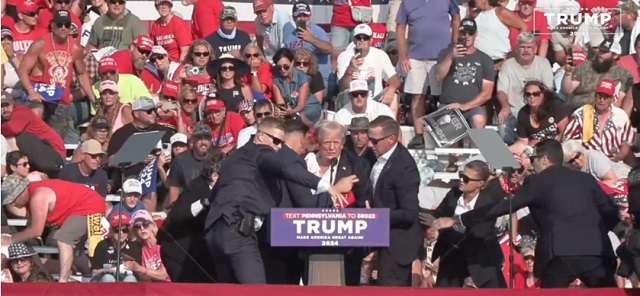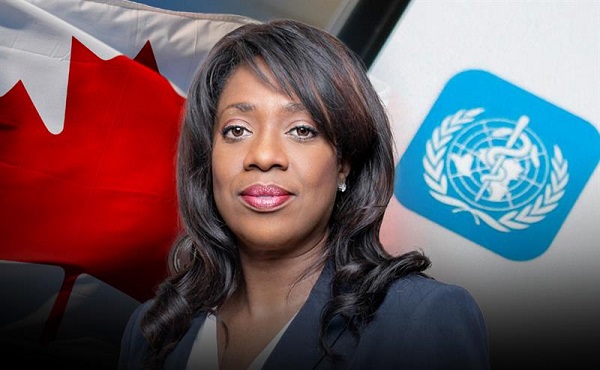International
Hawley: Whistleblowers say Trump’s security detail was unprepared, inexperienced

From The Center Square
Senate committee holding bipartisan investigation, hearing
Multiple whistleblowers have come forward telling U.S. Sen. Josh Hawley, R-Mo., that many working as part of former President Donald Trump’s security detail at a rally in Pennsylvania one week ago weren’t Secret Service and were “unprepared and inexperienced personnel,” Hawley says.
The accusation comes after the U.S. Senate Homeland Security and Governmental Affairs Committee, on which Hawley sits, announced it will conduct a bipartisan investigation into the July 13 assassination attempt of Trump.
Multiple whistleblowers contacted his office “with disturbing new information behind the assassination attempt on the former president,” he said.
They did so after Hawley opened a whistleblower tip line, pledging to protect the anonymity of everyone who contacts his office. Whistleblowers are encouraged to make protected disclosures by calling (202) 224-6154 or emailing [email protected].
In response to the information he has received so far, Hawley contacted Department of Homeland Security Secretary Alejandro Mayorkas, who oversees the U.S. Secret Service, demanding answers.
“Whistleblowers who have direct knowledge of the event have approached my office. According to the allegations, the July 13 rally was considered to be a ‘loose’ security event,” he wrote to Mayorkas.
“Whistleblower allegations suggest the majority of DHS officials were not in fact USSS agents but instead drawn from the department’s Homeland Security Investigations. This is especially concerning given that HSI agents were unfamiliar with standard protocols typically used at these types of events, according to the allegations.”
Other security failures identified, he says, include not using canine units to monitor entry and detect threats among the perimeter or crowd; unauthorized individuals accessing the backstage areas; and DHS personnel not “appropriately polic[ing] the security buffer around the podium and … not stationed at regular intervals around the event’s security perimeter.”
Hawley demanded answers after DHS “has not been appropriately forthcoming with members of Congress,” he said, and after he called on the committee’s chair, U.S. Sen. Gary Peters, D-Mich., to immediately launch an investigation.
“Although we still do not have all the facts, the little that we do know suggests a staggering security failure,” he wrote to Peters. “Evidently, the shooter was able to gain an elevated position on a rooftop with a clear line of sight of the President, well within accurate range, with a firearm. The details of this tragedy must be vigorously investigated by Congress, including the motive of the shooter, and the serious operational failures that occurred on July 13.” Hawley called on Peters to “launch a full, public, and comprehensive committee investigation into this assassination attempt and failures to adequately protect the former president,” including calling Mayorkas and Secret Service Director Kimberly Cheatle to testify.
Peters and U.S. Sen. Rand Paul, R-KY, the ranking member of the committee, announced the committee will conduct a bipartisan investigation and hold a hearing. They first requested an urgent briefing with the Secret Service, DHS and the Federal Bureau of Investigation. A call committee members did have, Hawley says, was ended before they could ask a single question. “This is completely unacceptable and contrary to the public’s interest in transparency,” he added.
Peters said the committee “is focused on getting all of the facts about the security failures that allowed the attacker to carry out this heinous act of violence that threatened the life of former President Trump, killed at least one person in the crowd, and injured several others.”
Peters and Paul also sent letters to Mayorkas and to FBI Director Christopher Wray requesting a range of documents and information on security process, among other information. A briefing was requested before July 25 and a public hearing is scheduled for Aug. 1.
Hawley is also demanding answers from BlackRock CEO Larry Fink requesting all records related to the assassination attempt after it became public that the alleged shooter appeared in one of BlackRock’s commercials.
What appears to be a clip of the commercial “has circulated widely on social media and raised the question about what your company knows about the shooter,” Hawley told Fink.
Fink is requested to provide the information by July 24.
When accepting his party’s nomination for president, Trump said at the Republican National Convention last week that surviving the assassination attempt was “a gift from God.” At a rally on Saturday, one week after the shooting, he said he “took a bullet for democracy.”
Honest reporting on election integrity
Health
Leslyn Lewis urges Canadians to fight WHO pandemic treaty before it’s legally binding

From LifeSiteNews
Conservative MP Leslyn Lewis is urging Canadians to demand a parliamentary debate on the WHO Pandemic Agreement, highlighting risks to national sovereignty.
Conservative Member of Parliament (MP) Leslyn Lewis called on Canadians to petition against the World Health Organization’s (WHO) pandemic treaty before it becomes legally binding.
In an October 23 post on X, Lewis encouraged Canadians to demand that politicians debate the WHO Pandemic Agreement before it becomes law after warnings that the treaty could undermine national freedom and lead to global surveillance.
“I have raised red flags about its implications on Canada’s health sovereignty and the federal government’s willingness to enter a legally binding treaty of this weight without any input from Parliament,” she declared.
In May, Canada, under Liberal Prime Minister Mark Carney, adopted the treaty despite warnings that the agreement gives the globalist entity increased power in the event of another “pandemic.”
However, Lewis revealed that since the agreement has yet to be officially signed, Canada is not bound to it and can still make amendments.
“We are now in a critical window of opportunity to ask tough questions and debate the treaty before it is signed by the Minister of Foreign Affairs and binds our nation,” she explained.
Lewis encouraged Canadians to sign a petition calling for a debate of the agreement as well as contacting their local MPs to request a parliamentary review of the treaty.
Lewis revealed that Canadians’ persistent opposition to the treaty has already resulted in some of the more dangerous clauses, including restricting free speech, freedom of movement, and government surveillance, being removed from the final agreement.
“Thanks to the engagement of countless Canadians and concerned citizens around the world, the most extreme provisions in the WHO Pandemic Treaty were removed — these measures would have undermined national healthcare sovereignty and given international bureaucrats sweeping powers,” Lewis declared.
“The removal of provisions on vaccine mandates, misinformation and disinformation, censorship requirements, travel restrictions, global surveillance, and mandatory health measures happened because people paid attention and spoke up,” she continued.
Among the most criticized parts of the agreement is the affirmation that “the World Health Organization is the directing and coordinating authority on international health work, including on pandemic prevention, preparedness and response.”
While the agreement claims to uphold “the principle of the sovereignty of States in addressing public health matters,” it also calls for a globally unified response in the event of a pandemic, stating plainly that “(t)he Parties shall promote a One Health approach for pandemic prevention, preparedness and response.”
Business
Bill Gates walks away from the climate cult

Billionaire Bill Gates — long one of the loudest voices warning of climate catastrophe — now says the world has bigger problems to worry about. In a 17-page memo released Tuesday, the Microsoft co-founder called for a “strategic pivot” away from the obsessive focus on reducing global temperatures, urging leaders instead to prioritize fighting poverty and eradicating disease in the developing world. “Climate change is a serious problem, but it’s not the end of humanity,” Gates wrote.
Gates, 70, argued that global leaders have lost perspective by treating climate change as an existential crisis while millions continue to suffer from preventable diseases like malaria. “If I had to choose between eradicating malaria and preventing a tenth of a degree of warming, I’d let the temperature go up 0.1 degree,” he told reporters ahead of next month’s U.N. climate conference in Brazil. “People don’t understand the suffering that exists today.”
For decades, Gates has positioned himself as a leading advocate for global climate initiatives, investing billions in green energy projects and warning of the dangers of rising emissions. Yet his latest comments mark a striking reversal — and a rare admission that the world’s climate panic may have gone too far. “If you think climate is not important, you won’t agree with the memo,” Gates told journalists. “If you think climate is the only cause and apocalyptic, you won’t agree with the memo. It’s a pragmatic view from someone trying to maximize the money and innovation that helps poor countries.”
The billionaire’s change in tone is sure to raise eyebrows ahead of the U.N. conference, where climate activists plan to push for new emissions targets and wealth transfers from developed nations. Critics have long accused Gates and other elites of hypocrisy for lecturing the public about fossil fuels while traveling the globe on private jets. Now, Gates himself appears to be distancing from the doomsday rhetoric he once helped spread, effectively admitting that humanity faces more immediate moral imperatives than the weather.
(AP Photo/Alex Brandon)
Stunning Climate Change pivot from Bill Gates. Poverty and disease should be top concern.
-

 Business1 day ago
Business1 day agoTrans Mountain executive says it’s time to fix the system, expand access, and think like a nation builder
-

 Alberta2 days ago
Alberta2 days agoPremier Smith sending teachers back to school and setting up classroom complexity task force
-

 Alberta2 days ago
Alberta2 days agoThousands of Albertans march to demand independence from Canada
-

 Crime2 days ago
Crime2 days agoSuspect caught trying to flee France after $100 million Louvre jewel robbery
-

 Economy1 day ago
Economy1 day agoStunning Climate Change pivot from Bill Gates. Poverty and disease should be top concern.
-

 Addictions1 day ago
Addictions1 day agoThe Shaky Science Behind Harm Reduction and Pediatric Gender Medicine
-

 Business1 day ago
Business1 day agoClean energy transition price tag over $150 billion and climbing, with very little to show for it
-

 Business1 day ago
Business1 day agoFlying saucers, crystal paperweights and branded apples: inside the feds’ promotional merch splurge







